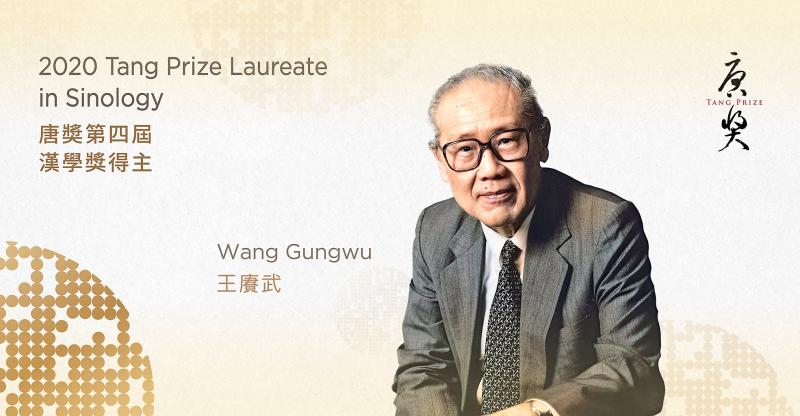Wang Gungwu (王賡武), an Australian historian who focuses on China-Southeast Asian relations, was yesterday announced as the winner of this year’s Tang Prize for Sinology for his research into the Chinese world order, Chinese overseas and Chinese migratory experience.
Academia Sinica vice president Huang Chin-Shing (黃進興), who is chairman of the Tang Prize selection committee, made the announcement at a news conference in Taipei.
Wang has developed a unique approach to understanding China by scrutinizing its long and complex relationships with its southern neighbors, which “enriched the explanation of China’s changing place in the world, traditionally developed from an internalist perspective or in relation to the West,” Huang said.

Photo provided by the Tang Prize Foundation
The 89-year-old enjoys a unique vantage point that affords distinctive insights into Chinese history, as he was born in Indonesia and educated in British Malaya and London, the Tang Prize Foundation said of Wang.
Wang, who graduated from the School of Oriental and African Studies at the University of London and continued his academic career in Malaya, Australia, Hong Kong and Singapore, is an expert in the interpretation of how China views the world, the foundation said.
His work has modern implications, showing that although China’s southern maritime outreach has clearly become central to its economic development, as shown by the Belt and Road Initiative, potential conflicts with Southeast Asian nations have yet to be understood and properly dealt with, it said.
In addition to Wang’s academic achievements, he has also been a model leader, holding positions including president of the University of Hong Kong and chairman of the Institute of East Asian Political Economy in Singapore.
The honors he has received include Fellow of the Australian Academy of the Humanities, Commander of the Order of the British Empire, the international Fukuoka Asian Cultural Prize and foreign honorary member of the American Academy of Arts and Sciences, the foundation said.
The Tang Prize is a two-yearly award established in 2012 by Taiwanese entrepreneur Samuel Yin (尹衍樑), chairman of the Ruentex Group, to honor people who have made prominent contributions in four categories — sustainable development, biopharmaceutical science, Sinology and rule of law.
Winners of the prize receive a cash award of NT$40 million (US$1.35 million) and NT$10 million in research funding, along with a gold medal and a certificate.
A week-long program for the awards ceremony is to begin on Sept. 20.
The inaugural Sinology winner was Yu Ying-shih (余英時), while William Theodore de Bary won the 2016 prize. In 2018, the prize was shared by Stephen Owen and Yoshinobu Shiba.

The Chinese military has built landing bridge ships designed to expand its amphibious options for a potential assault on Taiwan, but their combat effectiveness is limited due to their high vulnerability, a defense expert said in an analysis published on Monday. Shen Ming-shih (沈明室), a research fellow at the Institute for National Defense and Security Research, said that the deployment of such vessels as part of the Chinese People’s Liberation Army (PLA) Navy’s East Sea Fleet signals a strong focus on Taiwan. However, the ships are highly vulnerable to precision strikes, which means they could be destroyed before they achieve their intended

About 4.2 million tourist arrivals were recorded in the first half of this year, a 10 percent increase from the same period last year, the Tourism Administration said yesterday. The growth continues to be consistent, with the fourth quarter of this year expected to be the peak in Taiwan, the agency said, adding that it plans to promote Taiwan overseas via partnerships and major events. From January to June, 9.14 million international departures were recorded from Taiwan, an 11 percent increase from the same period last year, with 3.3 million headed for Japan, 1.52 million for China and 832,962 to South Korea,

SOVEREIGNTY: The rigs show that Beijing ‘rejects Taiwan’s jurisdiction’ by building in areas where Taipei demands permission to build or alter installations Chinese oil rigs have been sighted just 26 nautical miles (42km), from Taiwan’s exclusive economic zone (EEZ) near Pratas Island (Dongsha Island, 東沙島), posing a threat to Taiwan’s sovereignty if left unchallenged, a brief published by the Jamestown Foundation on Tuesday said. Pratas Island, 444km from Kaohsiung, is northeast of the South China Sea and houses a Taiwanese garrison. The brief, titled “Rigging the Game: PRC Oil Structures Encroach on Taiwan’s Pratas Island” — referring to the People’s Republic of China — analyzed photographs and said that Beijing’s tools to pressure Taiwan now include oil rigs. “Oil rigs now constitute part of Beijing’s

The Taiwan Experience Education Program (TEEP) has funded short-term internships in Taiwan for more than 4,500 young people from more than 40 countries since 2015, with the goal of attracting and retaining international talent, the Ministry of Education said yesterday. Fifty-five colleges launched 514 projects this year, including in fields such as semiconductors, artificial intelligence, medicine and biotechnology, green energy, and sustainability, it said. The program provides research and practical internships in Taiwan for two to six months, and offers cultural exchange and networking opportunities, the ministry said. For example, National Formosa University’s Embedded System and Autopilot Laboratory developed two solar-powered drones in